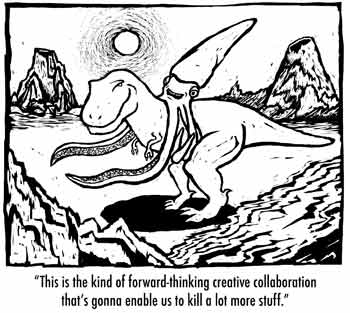
The Christian apologistʼs “argument from moral duties” as seen here is merely a twist on the “argument for God based on morality.” But there is no validity to either argument once you consider that even in a cosmos “with God” all pain-inducing acts of nature on humans (as well as humans on humans) remain possible just as in a cosmos “without God.” So the “argument” reflects the Christian apologistʼs fear that we live in a wild and wooly cosmos and their hope that peopleʼs behaviors can be controlled if we all agreed to their particular philosophical/religious views including their unproven assertion that a list of human behavioral likes and dislikes comes “from God.”
But does such a list of likes/dislikes come from God? Humans are prone to constructing top ten lists of what they like or dislike on any subject under the sun, we spend loads of time rating and comparing things inside our heads, and many items on such lists no doubt overlap, especially in the sense of “I donʼt like even the thought of some other person in reality taking away my life or belongings based on that other personʼs whims. Neither do I like the psychological displeasure of being called insulting names, etc.” Those particular dislikes are found on a vast number of peopleʼs inner lists and incorporated into a vast number of holy books, dramas, novels and books of practical moral philosophy spanning ages, not just “in the Bible.” Apologists who want to play at proving God via the “moral argument” should also consider how many large-brained mammals like being part of a society of other large-brained mammals, and engage in peacemaking behaviors so as to remain a part of that society. They should also consider that many animals, especially those with large mammalian brains share not only loads of pain receptors but mirror neurons. And lastly they should consider the brain-mindʼs ability to foresee how pain can come round again to the person who inflicts it if pain or social disorder is allowed to continue and expand. Those make at least as much explanatory sense as the assertion that “God did it,” but without necessarily disproving God, nor affirming the existence of God.
Also, apologists should consider that when human societies were tribal and smaller in number everyone could learn each otherʼs behavior patterns and could together shun a person that had high pain-inducing behaviors, or employ feuds and vendettas on rival tribes. Neither was there much to lose in the way of all the benefits of modern civilization if one lived back in tribal times and oneʼs reed or mud hut was burned to the ground, compared with say, blowing up a modern day metropolis and destroying an enormously complicated infra-structure of food production, storage, and a thousand different inter-connected business establishments. In the case of the tribesmen, they just need to build another reed hut, which they might be able to do with natural materials growing not far from them.
But as human societies grew, everyone could no longer know each other personally and act together to shun those whom they all knew to practice the most pain-inducing behaviors, therefore abstract generalizations and laws and peace-keeping tactics grew in importance.
Today we are connected more globally than ever before, with videos of people from different places showing their aggressive as well as day-to-day, and peace-making practices in their societies, and we see more of ourselves in outsiders than ever before. While computers continue to break down language barriers, and, movies, novels, and other materials are shared and distributed worldwide, which means we are all learning to recognize how much we share rather than lacking direct vision of outsiders and their lives in all their fullness and diversity.
Today we also live relatively peacefully in enormous cities packed with millions of us (something other primates probably could never do), and amuse ourselves in a wider variety of non-murderous ways than ever before. So today the problems we face together on this planet appear to be the enormous amounts of energy and other products made from nature to support such a huge interconnected worldwide population, and if our infrastructure grows too polluted or our energy supply is cut off, civilization could revert to barbarism and a billion or more people could suffer. That appears to be the danger today, not the problem of how many people are going to hell because they donʼt believe like certain Christian apologists assure us we all must believe.
Speaking of which, I wonder if Christian apologists have considered how many people will die and wake up in heaven who knew little to nothing about Christianity while on earth? What kind of a Divine Plan is it that includes such facts as these:
Half of all human zygotes naturally perish before the develop to the point of being born, as even admitted by a pro-life doctor.
About 20-30 percent of zygotes undergo a twinning after which one of the twins is reabsorbed into the womb or the remaining zygote.
Until the 18th century half of all children born died before reaching the age of eight years old due to many natural diseases and infections they are prone to.
Natural disasters have killed large populations indiscriminately for tens of thousands of years. Not to mention that according to estimates by a renowned population bureau, seven billion human beings had lived and died on earth before Jesus was born.
Christianity is spread via human beings, which leaves much of the world unevangelized and/or told confusing information or wrong information, and even many who heed the call to become Christians wind up nominal ones, leading to many people who know little to nothing about "true" Christianity as "evangelicals" define it.
My Point Is That
IF “God forgives and saves” all those dead zygotes, and all those children who died from 1-8 years old, and the 7 billion people who died before Jesus was born, as well as those who have not heard the Gospel or heard a confused message or the wrong message,
THEN heaven will be filled to overflowing with people who arrived there knowing little to nothing about Christianity. Great Divine plan. (While those of us, who do know something about Christianity, are damned?)
Makes sense I guess (if you happen to be someone like yourself).
Reminds me of the old joke involving the missionary and the Eskimo. An Eskimo hunter asked the local missionary priest, “If I did not know about God and sin, would I go to hell?”
“No,” said the priest, “not if you did not know.”
“Then why,” asked the Eskimo earnestly, “did you tell me?”
Of all the failures of which we have any history or knowledge, the missionary effort is the most conspicuous. The whole question has been decided here, in our own country, and conclusively settled. We have nearly exterminated the Indians, but we have converted few.
There is an old story of a missionary trying to convert an Indian. The Indian made a little circle in the sand and said, “That is what the Indian knows.” Then he made another circle a little larger and said, “That is what missionary knows, but outside there the Indian knows just as much as missionary.”
Great minds in evangelical seminaries across the country continue to dispute among themselves as to what is to become of the heathen who fortunately died before meeting any missionary from their institutions.
Robert Ingersoll





